Building a website has become easier than ever, thanks to the wide range of website builders available. Whether you’re a small business owner, a blogger, or an aspiring entrepreneur, finding the right website builder can make all the difference.
In this article, we have compiled a list of the best website builders that offer user-friendly interfaces, flexible customization options, and a host of features to help you create a stunning online presence. Whether you’re a beginner or an experienced developer, explore our list to find the perfect website builder that suits your needs and empowers you to bring your vision to life.
Criteria for Our Best Website Builder Review
When evaluating the best website builders, we consider various criteria, with the following five elements being our primary focus:
- Ease of Use: We prioritize website builders that are beginner-friendly, providing customizable drag-and-drop builders, powerful editing tools, and ample design customization options.
- Pricing: In a competitive market, we assess the value for money offered by each website builder, including factors such as free domains, SSL certificates, business email, and eCommerce features. We also examine any additional costs or hidden fees that may affect small business owners.
- Design & Features: We evaluate the range of professional website templates offered by the builders, as well as the ability to incorporate features like Google Analytics, CRM integration, and third-party marketing tools, ensuring flexibility for diverse needs.
- Customer Support: While we expect user-friendly interfaces, we prioritize website builders with accessible 24/7 customer support to address any queries or concerns that may arise.
- Data Ownership & Portability: Recognizing the importance of data control, we thoroughly review terms of service and privacy policies to ensure that users maintain ownership of their data and can easily transfer it if needed.
These criteria form the basis of our assessment, enabling us to recommend website builders that prioritize usability, affordability, design options, support, and data control.
1. WordPress
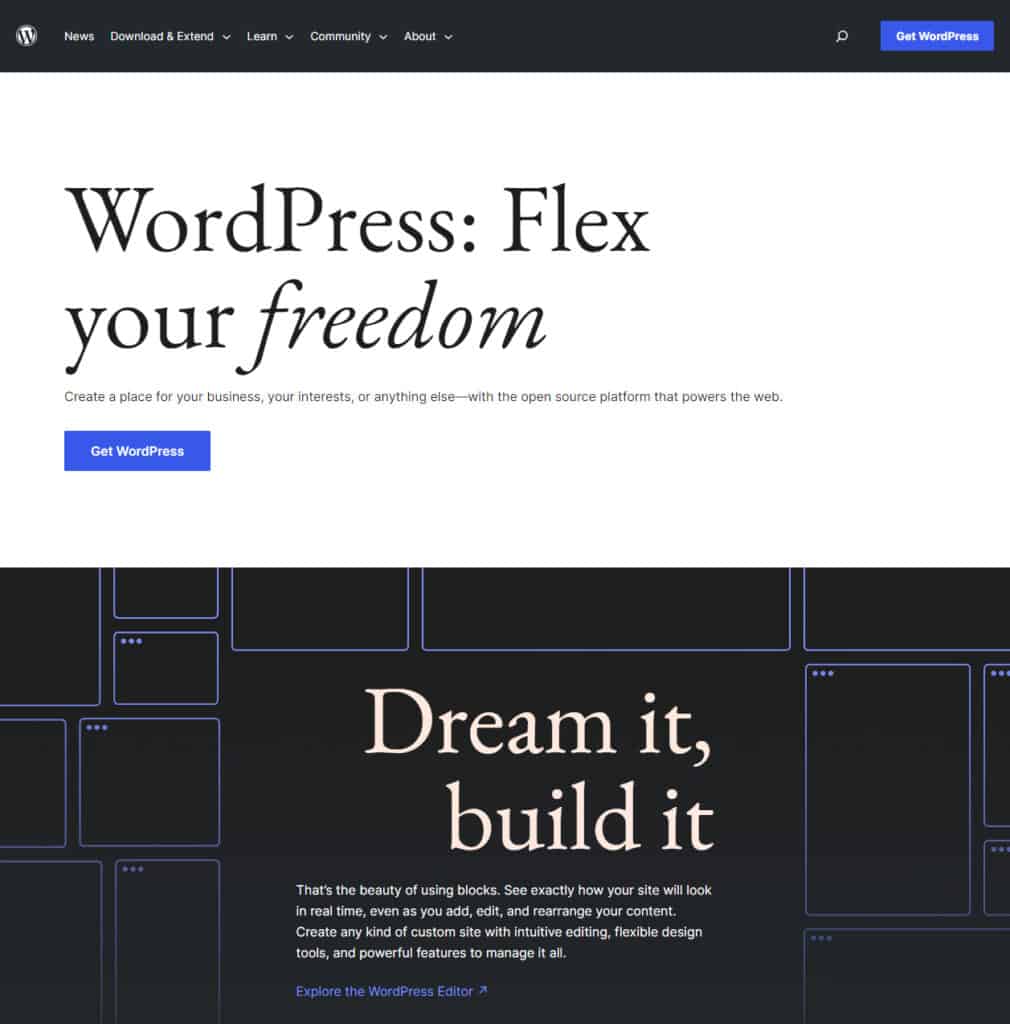
WordPress is the leading website building platform worldwide. It powers over 43% of all websites on the internet, making it the most popular option.
There are two versions of WordPress: self-hosted WordPress CMS and WordPress.com. We recommend the self-hosted version. We recommend WordPress to anyone starting a podcast who needs a website.
WordPress is an open-source and free website builder, granting you maximum control over your website compared to other online website builders mentioned here.
By using WordPress, you retain complete ownership of your website, free from any third-party influence, ensuring maximum privacy. You can customize it in countless ways with themes and plugins. There are countless options and marketplaces to find what you need.
Pros of building a site with WordPress
- Vast community of users and resources for support.
- Extensive collection of themes, plugins, and options.
- Suitable for all types of websites.
- User-friendly interface(good for beginners and experienced users).
- Built with search engine optimization (SEO) best practices in mind.
- Scalable to handle increased traffic, content, and functionality.
- Regular updates and security patches make it a secure platform.
- WordPress itself is free to use.
Cons of building a site with WordPress
- High learning curve for beginners
- Requires regular updates, backups, and maintenance.
- Third-party themes and plugins may not be secure.
- Advanced customization may require some coding knowledge or a developer.
- Some plugins may not be compatible with each other.
- Poorly optimized themes or plugins can impact performance.
- Support is limited for free themes and plugins.
- Themes, plugins, and services may come with additional cost.
2. Web.com

Web.com is one of the best website builders that aims to simplify the process of creating a professional and functional website. It provides a user-friendly platform with drag-and-drop functionality, allowing individuals and businesses to design their websites without any coding knowledge.
With Web.com’s website builder, users can choose from a selection of customizable templates, enabling them to create a unique online presence that aligns with their brand. The builder offers a wide range of design elements, including images, fonts, colors, and layouts, allowing for a personalized and visually appealing website.
Additionally, Web.com provides essential features such as mobile optimization, SEO tools, and e-commerce functionality, making it suitable for various types of websites. It also offers reliable hosting services, ensuring that websites are accessible and perform well.
Pros of building a site with Web.com
- User-friendly interface with drag-and-drop functionality (no coding necessary).
- Customizable templates to create unique and visually appealing sites.
- Offers mobile responsiveness, SEO optimization, and ecommerce functionality.
- Reliable hosting services.
Cons of building a site with Web.com
- Limited overall design flexibility compared to other website builders.
- Very few advanced features for complex functionality.
- You are reliant on Web.com for hosting.
- The pricing structure is not as competitive or cost-effective as other builders.
- Ecommerce sites are limited to 50 products.
3. Wix
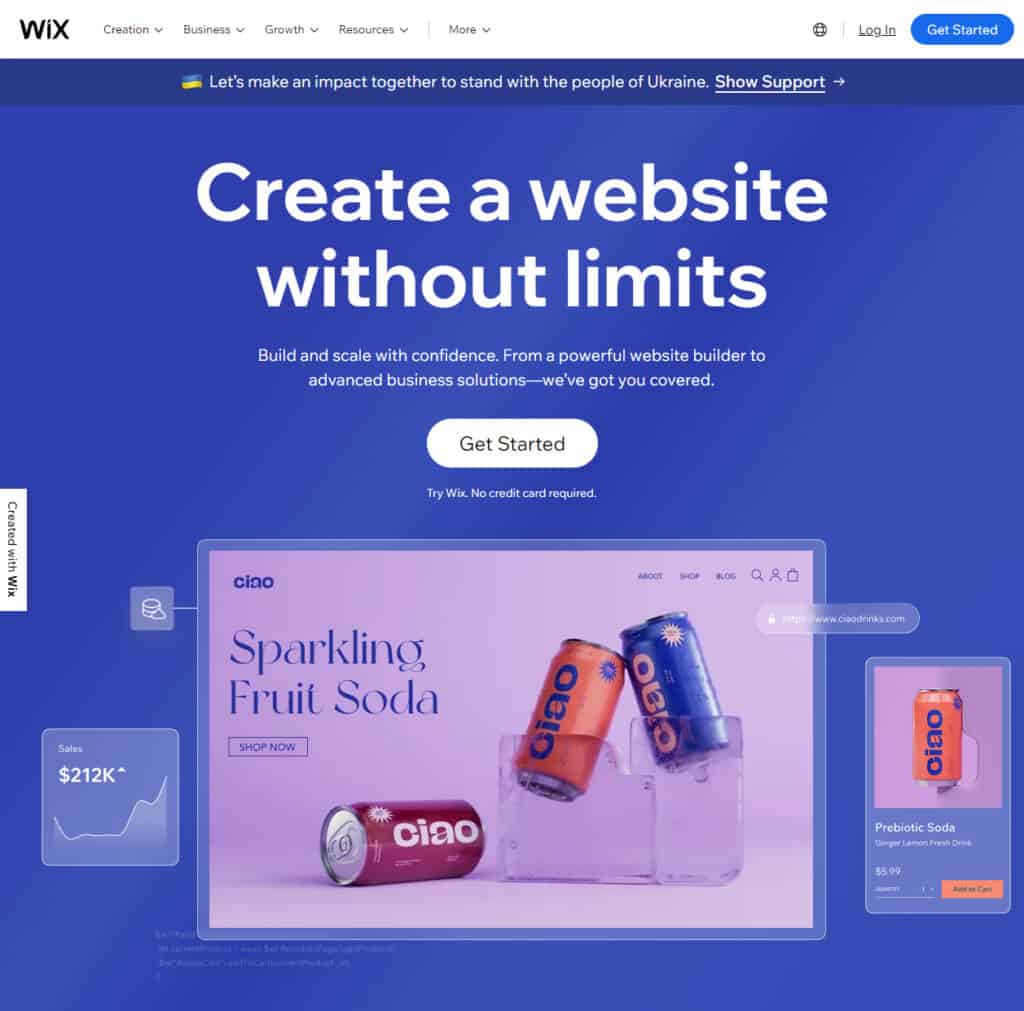
Wix is a popular AI-powered website builder that empowers individuals and businesses to create stunning and professional websites without coding knowledge. It offers a user-friendly platform with a drag-and-drop interface, allowing users to easily customize their website design.
With Wix, users can choose from a vast collection of templates, covering a wide range of industries and styles. These templates are fully customizable.
Wix also provides an extensive library of apps and widgets, allowing users to add functionality to their websites, such as contact forms, social media integrations, online stores, and more.
All Wix websites offer mobile optimization, SEO tools, and secure hosting.
Pros of building a website with Wix
- User-friendly drag-and-drop interface.
- Vast collection of appealing templates.
- Plenty of customization options.
- Extensive market of apps and widgets.
- Websites automatically optimized for mobile.
- Built-in SEO features
- Ecommerce functionality including products and secure payments.
- Reliable hosting services.
- Plenty of customer support via help articles, forums, and direct support.
Cons of building a website with Wix
- Limited design flexibility compared to other website builders
- Switching templates is challenging once you’ve selected one.
- Free version of Wix displays ads on your site.
- Advanced customization options require coding knowledge or the use of Wix Code.
- Limited apps/widgets/plugins compared to other platforms.
- Not suitable for sites that require complex functionality and high traffic volume.
- Advanced features require additional fees.
4. Squarespace
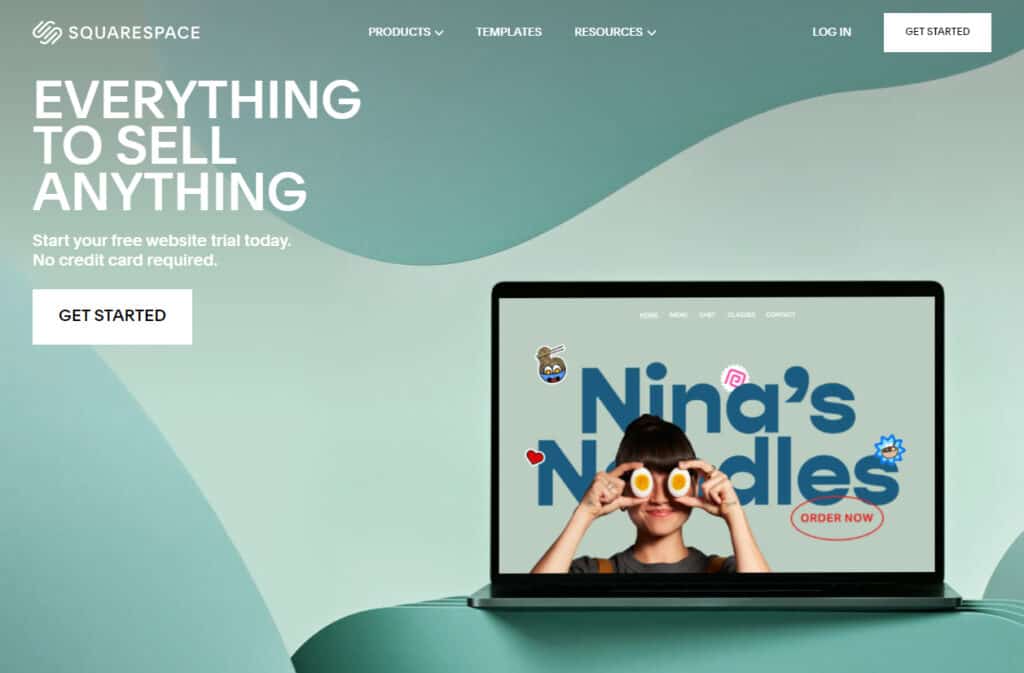
Squarespace stands out as a sophisticated website builder that caters to both creatives and businesses. It’s one of the easiest builders to navigate, allowing users to quickly set up their websites without complications.
The true standout feature of Squarespace lies in its template designs, which are rated the best in the market. It is the perfect choice for creatives seeking visually impressive websites that set them apart. It also offers an ecommerce plan with tools to manage your products, inventory, orders, coupons, and more.
Pros building a website with Squarespace
- Wide selection of visually stunning and professionally designed templates.
- Highly customizable templates.
- Intuitive and user-friendly interface.
- All websites are optimized for mobile devices.
- Features such as blogging, ecommerce, SEO, analytics, and social media integration.
- Reliable hosting services.
- 24/7 customer support through various channels.
- Seamless and integrated ecommerce platform.
Cons building a website with Squarespace
- Slight learning curve when navigating the platform and its features.
- Customization options are more limited compared to other website builders.
- Pricing plans are higher than other options.
- Limited selection of native and third-party plugins.
- Exporting your content to another platform is challenging.
- Limited support for multi-language websites.
- Basic blog functionality isn’t suitable for most bloggers.
5. GoDaddy
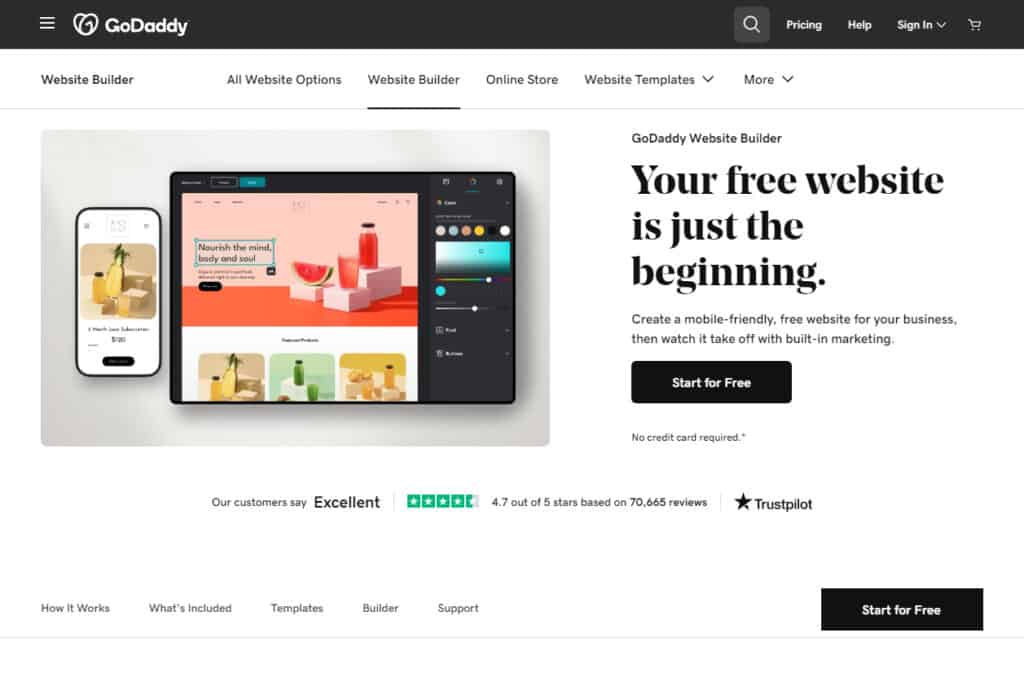
GoDaddy Website Builder is a user-friendly platform specifically for beginners who want to create their own websites without any coding knowledge. With its intuitive interface and drag-and-drop functionality, GoDaddy makes website building accessible and straightforward.
The GoDaddy Website Builder offers a range of professionally designed templates, catering to various industries and website types. These templates serve as starting points. From there, users can use the editor to add/arrange elements, such as text, images, videos, and forms.
Additionally, GoDaddy offers essential features such as mobile responsiveness, search engine optimization (SEO) tools, and social media integration, ensuring that websites created are visually appealing, optimized, and capable of reaching a wider audience.
Pros of building a website with GoDaddy
- Specifically designed for beginners.
- Drag-and-drop editor makes customizing a breeze.
- Variety of professionally designed templates to choose from.
- All websites optimized for mobile.
- Includes essential features, like forms, social media integration, and SEO.
- Reliable website hosting.
- Robust support and help options.
- Affordable pricing.
Cons of building a website with GoDaddy
- Customization options are limited compared to other website builders
- Limitations on scalability and functionality. Not a site to grow with.
- You’re forced to use GoDaddy’s hosting service.
- Few third-party integrations compared to other platforms.
- Exporting your content to a different platform in the future is challenging.
- Ecommerce features are too basic for most stores.
- Lower-tier plans display ads on your site.
6. HubSpot
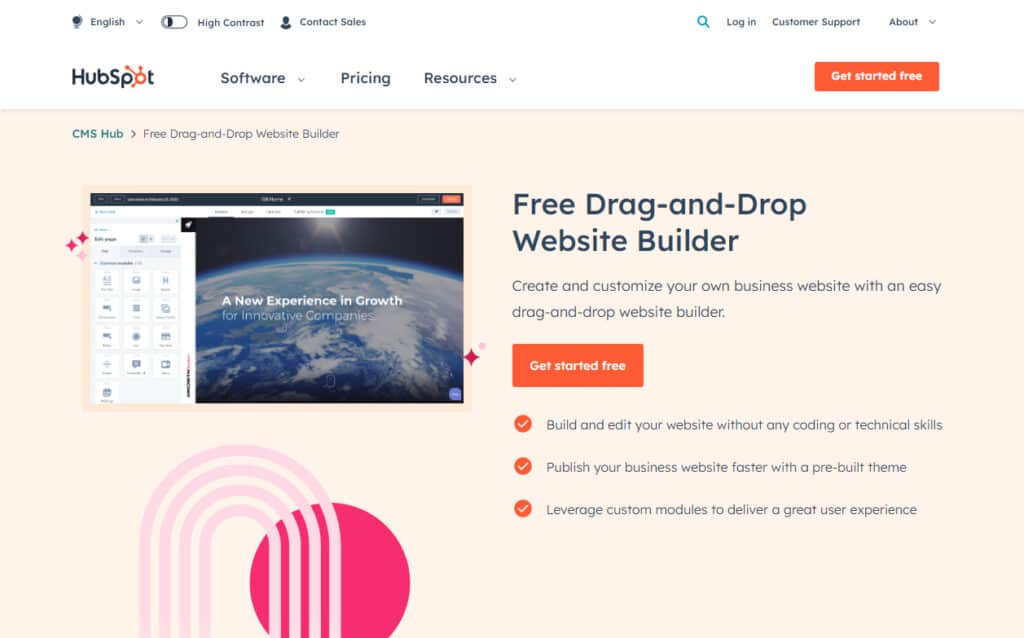
The HubSpot Website Builder is a comprehensive platform with the tools you need to create and manage professional websites. It is a part of the HubSpot CRM suite and seamlessly integrates with other HubSpot marketing and sales tools.
The HubSpot Website Builder offers a user-friendly interface and drag-and-drop functionality, making it easy to customize their website without code. It provides a range of features to enhance website functionality, including blogging tools, SEO optimization, form builders, live chat integration, analytics, and more.
One of the standout features of the HubSpot Website Builder is its deep integration with the HubSpot CRM, allowing users to leverage customer data and personalize website experiences based on visitor behavior and interactions. Additionally, it provides reliable hosting and security features to ensure websites are fast, secure, and accessible.
Pros of building a website with HubSpot
- Comprehensive suite of marketing and sales tools.
- User-friendly interface with a drag-and-drop editor.
- Integration with HubSpot CRM.
- Marketing features such as SEO tools, blogging, landing pages, and forms.
- Reliable website hosting.
- Analytics and reporting features.
- Active user community and offers extensive support resources.
Cons of building a website with HubSpot
- Not suited for full websites. Better for landing pages and one-page sites.
- Slight learning curve when navigating the platform and its features.
- Pricing plans are higher than many other website builders
- Limited customization options
- Locked into HubSpot’s hosting and infrastructure.
- Third-party integrations are very limited.
- Doesn’t offer advanced coding options.
7. Weebly
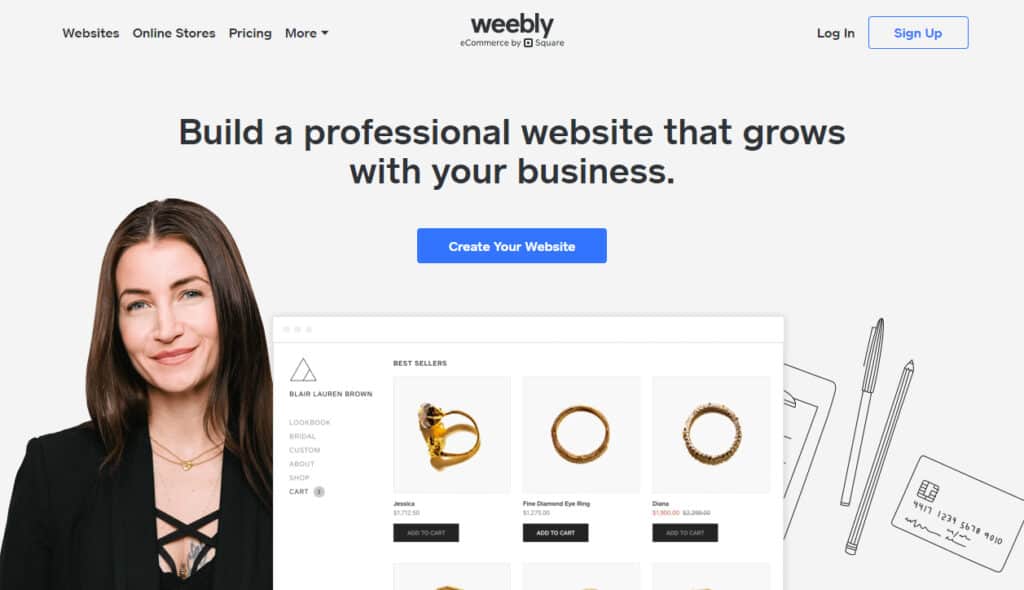
Weebly is a popular website builder that allows users to create professional websites with ease. Like many of the best website builders on this list, it offers a user-friendly drag-and-drop interface, a wide range of customizable templates.
With Weebly, users have the flexibility to design and customize their websites to suit their specific needs. It’s useful for ecommerce stores, small businesses, and blogs. It offers SEO tools and multimedia integration.
Weebly also offers reliable hosting services, ensuring that websites are fast, secure, and accessible to visitors. Additionally, it provides responsive customer support to assist users with any inquiries or technical issues they may encounter.
Pros of building a website with Weebly
- User-friendly, drag-and-drop interface to build your site.
- Wide selection of professionally designed, beautiful templates.
- All websites are mobile responsive and SEO ready. .
- Robust ecommerce features
- Reliable website hosting.
- Plenty of customer support and help tools.
Cons of building a website with Weebly
- Templates are limited in terms of flexibility.
- Not a scalable option. If you expect lots of traffic, look elsewhere.
- Once you build a website, it’s locked into Weebly. There’s no way to export.
- Pricing can be expensive if you need advanced features.
- Free plan includes advertisements displayed on your website.
- App marketplace has fewer options than other platforms.
FAQs About the Best Website Builders
Still have questions? Here are some common questions people ask about the best website builders.
Are website builders worth it?
Yes, website builders can be worth it for individuals and businesses who want to create a website quickly and easily without the need for extensive technical skills or hiring a professional web designer. They offer convenience, affordability, and a user-friendly interface that allows users to build functional websites that meet their needs.
Which website builder software do professional web designers use?
Professional web designers often use website builders like WordPress, Wix, or Squarespace, as they provide flexibility, customization options, and the ability to create highly tailored websites for their clients. These platforms offer more advanced features, design capabilities, and coding options that cater to the specific requirements of professional web designers.
Is it better to code your own website than use a website builder?
The answer depends on your specific needs and level of expertise. Coding your own website provides complete control and customization options, making it suitable for those with coding skills and unique requirements, while website builders offer convenience, ease of use, and pre-designed templates, making them a better option for beginners or those looking to quickly create a functional website without extensive coding knowledge.
Can I switch my website builder software later?
Generally, no. With the exception of WordPress, most website builders (including the best website builders on this list) don’t make it easy to export your content to another platform. However, there are some third-party tools that may help.
Is WordPress really free?
Yes, WordPress is available for free as an open-source content management system (CMS). However, additional costs may be incurred for domain registration, web hosting, premium themes, plugins, and other optional features or services associated with building and maintaining a WordPress website.
Why is WordPress so popular?
WordPress is popular due to its versatility, ease of use, and extensive ecosystem of themes and plugins that allow users to create highly customizable websites. It also has a large and supportive community, regular updates, and a long-established reputation, making it a trusted choice for individuals, businesses, and developers.
Are there any hidden costs to building a website?
Yes, there can be hidden costs associated with building a website. These costs may include domain registration fees, web hosting charges, premium themes or plugins, custom development or design services, ongoing maintenance and updates, and additional features or integrations that may require paid subscriptions. It’s important to carefully consider and plan for these potential expenses to avoid any surprises.
Which is the best website builder for SEO?
There are several website builders that offer good SEO capabilities, but Wix, Squarespace, and WordPress are often considered among the best for SEO. Wix provides built-in SEO tools and offers a user-friendly interface for optimizing website content. Squarespace offers solid SEO features, including customizable page titles, meta descriptions, and URL structures. WordPress, with its extensive plugin ecosystem, provides robust SEO options through plugins like Yoast SEO, giving users granular control over their website’s optimization.
How do other free website builders make money if I use it for free?
Most website builders make money in two ways. First, they offer a limited freemium version to get customers into their platform, and then charge for upgrades in advance features. Second, some builders show ads on your website if you use their free plan.
How can I create my own website for free?
Do I need to buy web hosting to build a website?
Yes, you will need to purchase web hosting to build a website. Web hosting provides the server space and infrastructure required to make your website accessible on the internet. Some of the best website builders include hosting with their packages.
Our Pick for the Best Website Builder
After carefully evaluating the best website builders, we strongly recommend using WordPress to power your site. We recommend it for anyone, but especially for podcasters.
In fact, we have a complete guide on building a podcast website using WordPress for your podcast. It’s an important part of promoting your podcast.
WordPress is a smart choice for beginners with simple needs who don’t want to work with code, as well as experts who need advanced functionality and customizations. The core software and many themes and plugins are totally free.
Which website builder do you use to power your site? Let us know in the comments.


